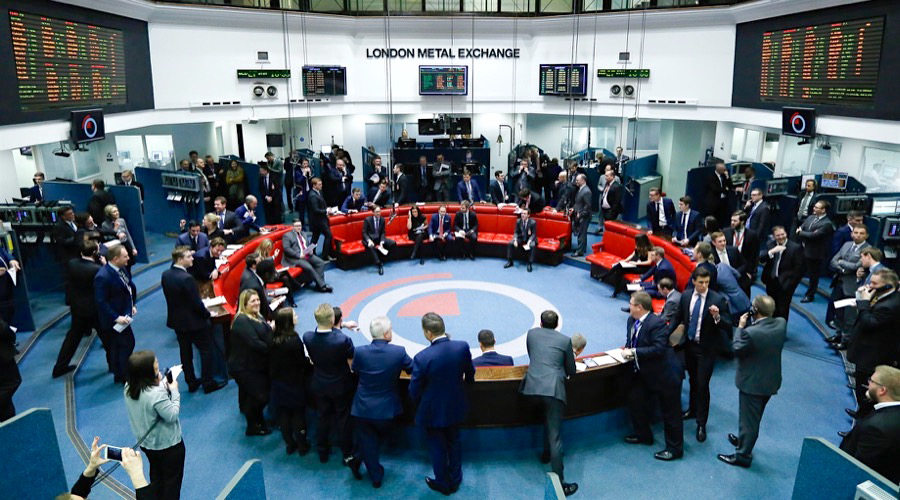CRIMINAL CAPITALI$M
Comment: The return of the London Metal Exchange’s nickel curseReuters | March 21, 2023 |

London Metal Exchange – Image from Achives
The London Metal Exchange (LME) has discovered that some of its registered nickel is missing.

Nine warrants, equivalent to 54 tonnes, have been declared invalid after being found to be “non-conformant with the contract specifications”, the LME said in a March 17 notice.
What should have been bags of nickel briquettes grading at least 99.8% pure metal have turned out to be bags of stones.
The incident comes one month after Trafigura took a $577 million charge against cargoes of nickel that turned out to be steel. The trading company alleges “a systematic fraud” and is pursuing legal action against companies associated with Indian businessman Prateek Gupta. A spokesperson for Gupta has said that they were preparing “a robust response” to the allegations.
The latest incident also comes almost exactly one year after the LME suspended nickel trading and canceled trades, a fateful decision that has generated a slew of lawsuits from disgruntled fund players and an unprecedented enforcement investigation by UK regulators.
The LME, owned by Hong Kong Exchanges and Clearing, seems to be cursed by the devil’s metal.
Missing nickel
It’s not the first time that LME nickel stocks have been in the legal limelight but previous scams, such as one which resulted in a courtroom tussle between Natixis and Marex after the unraveling of a repo deal in 2017, were based on false receipts.
This one seems to be a much more basic deception and one which raises serious questions about the controls at the warehouse operator in question.
LME rules stipulate that all metal placed on warrant must be weighed, a requirement that is particularly important if the metal is bagged and can’t be visually checked for any irregularities.
It is clearly also in the warehouse operator’s own interest not to accept anything which isn’t what it seems, particularly a metal that is currently valued at $22,750 per tonne.
Bags of stones shouldn’t pass any inspection, whether at original load-in or during the annual audit of registered stock required by the LME’s warehousing agreement.
Access World has confirmed to Reuters the fake nickel was located in one of its sheds in Rotterdam. The company “is currently undertaking inspections of warranted bags of nickel briquettes at all locations and will engage external surveyors to assist,” it said.
Access was owned by Glencore until January when it was sold to Global Capital Merchants.
The LME has required every other warehouse operator to check its nickel and advised holders of off-warrant stocks to do their own inspections if they haven’t already after the Trafigura revelations.
So far at least, there is nothing to suggest that this wasn’t a one-off incident, affecting just 0.14% of live LME nickel stocks, according to the LME.
Reputational hit
The LME, it is worth noting, does not itself own or operate warehouses for the storage of warranted metal but rather licenses approved operators.
Warehouse companies seeking LME approval must meet a host of capital adequacy, insurance and detailed operating qualifications. They must also allow routine inspections by exchange staff to inspect warranted metal.
LME registration is therefore something of a gold standard for metals warehousing, which is why the exchange can boast over 500 facilities across 32 locations in Asia, Europe and the United States.
Or at least it was.
While we wait to find out exactly how 54 tonnes of nickel were replaced with stones, the reputational damage to the LME’s storage system has already been done.
The LME may not own or operate any sheds but it is the front-line regulator of its warehousing system.
Deliverability lies at the heart of the LME’s price discovery role and good warehousing practice is critical to maintaining an orderly market.
It’s a point the exchange has repeatedly underlined in past clashes with warehouse operators over long load-out queues, which disrupted the relationship between LME and physical market pricing.
An isolated incident at one particular warehouse wouldn’t at any other time have much impact on the LME’s broader reputation.
But it folds into the bigger issues around the exchange’s governance and regulatory capacity after the blow-out of the nickel contract this time last year.
Broken nickel
The latest scandal will also intensify the question of whether the LME nickel contract is fulfilling the function of an efficient price discovery forum.
The mismatch between the LME’s Class I refined nickel contract and the new flows of nickel chemicals feeding the electric vehicle battery sector was a root cause of last year’s market mayhem.
The big short in the market, China’s Tsingshan Group, may be the world’s largest producer but not in a form it could deliver against its positions on the LME.
The nickel market was already looking for different pricing solutions before the March 8, 2022 suspension of LME nickel trading. The subsequent collapse in activity has fuelled the debate.
Average daily volumes on the LME contract were 34,613 lots in February, down 58% on February 2022, the last full month of trading before the March breakdown.
The LME is hoping that the restoration of trading in Asian hours will revive flagging activity.
The first attempt was blocked in January by Britain’s Financial Conduct Authority (FCA) due to concerns about the LME’s ability to maintain market order.
It finally got the go-ahead to extend hours on March 20, a date which has just been pushed back a week to next Monday so everyone can check their nickel, particularly if it’s bagged.
The LME already had a mountain to climb to rebuild trust in its nickel contract. The mountain has just grown by another 54 tonnes of stone.
(The opinions expressed here are those of the author, Andy Home, a columnist for Reuters.)
(Editing by Susan Fenton)
No comments:
Post a Comment